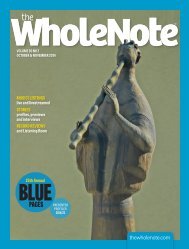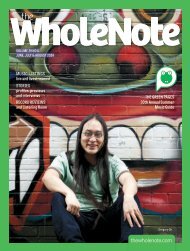Volume 25 Issue 7 - April 2020
After some doubt that we would be allowed to go to press, in respect to wide-ranging Ontario business closures relating to COVID-19, The WholeNote magazine for April 2020 is now on press, and print distribution – modified to respect community-wide closures and the need for appropriate distancing – starts Monday March 30. Meanwhile the full magazine is right here, digitally, so if you value us PLEASE SHARE THIS LINK AS WIDELY AS YOU CAN. It's the safest way for us to reach the widest possible audience at this time!
After some doubt that we would be allowed to go to press, in respect to wide-ranging Ontario business closures relating to COVID-19, The WholeNote magazine for April 2020 is now on press, and print distribution – modified to respect community-wide closures and the need for appropriate distancing – starts Monday March 30. Meanwhile the full magazine is right here, digitally, so if you value us PLEASE SHARE THIS LINK AS WIDELY AS YOU CAN. It's the safest way for us to reach the widest possible audience at this time!
You also want an ePaper? Increase the reach of your titles
YUMPU automatically turns print PDFs into web optimized ePapers that Google loves.
Something in the Air<br />
Forging a Guitar Identity in<br />
Improvised Music<br />
KEN WAXMAN<br />
Probably the most popular instrument in the world in its various<br />
forms, the guitar poses unique challenges for analytical players.<br />
With the six-string front-and-centre in so many branches of<br />
music, how can one forge an individual path? Yet each of the<br />
plectrumists here has done so as uniquely as there are makes<br />
of guitars.<br />
For instance Nels Cline is in a situation<br />
many others would envy. As lead guitarist<br />
for American alternative rock band Wilco,<br />
he has a steady gig with a large following.<br />
Yet Cline has been an integral part of Los<br />
Angeles’ improvised music scene since<br />
the 1980s and immerses himself back<br />
in that context any chance he gets. The<br />
Radical Empathy Trio’s Reality and Other<br />
Imaginary Places (ESP 5035 espdisk.com) is a recent example. During<br />
two extended tracks the guitarist finds a place among the swirling<br />
dynamics propelled by two committed improvisers: drummer Michael<br />
Wimberley and keyboardist Thollem McDonas.<br />
Propelling relaxed finger-style chording alongside McDonas’<br />
acoustic piano on the second track and challenging a miasma of<br />
swirling synthesized kinetics from the keyboardist with corrosive<br />
string distortions on the first, Cline references either mainstream or<br />
fusion jazz. Yet in both cases backed by explosive rattles and ruffs from<br />
the drummer, confounding patterns trump convention. McDonas’<br />
keyboard expression moves from sentient hunt-and-peck chording to<br />
repetitive extraterrestrial-like glissandi during his solos. Cline’s amplified<br />
bugle-like pulsations easily make common cause with McDonas’<br />
distinctive sounds on the latter, as the guitarist’s gentling impressionistic<br />
fills do with the first strategy. Despite on-the-mark finger-styling<br />
guitar riffs alongside acoustic piano runs or knob-twisting guitar<br />
flanging meeting kinetic keyboard expansions, no one would confuse<br />
the two for Joe Pass with Oscar Peterson or, in the other case, with<br />
Sun Ra meeting Jimi Hendrix. Still, the way Cline fits both roles, while<br />
managing to propel his own guitar definition, demonstrates accomplishment.<br />
His individual musical empathy – and that of the others<br />
– comes across as radical as well as sympathetic, making the trio’s<br />
name highly appropriate.<br />
Far away from mainstream jazz and jazzrock<br />
fusion are the specially configured<br />
musical cycles of American guitarist Joe<br />
Morris and British saxophonist Evan Parker<br />
on The Village (Fundacja Słuchaj FSR<br />
13/2019 sluchaj.org). A first-ever duo<br />
recording, each player arrives with a<br />
distinctive instrumental approach worked<br />
out over years of experimentation. Copasetic but not compounded,<br />
the key to the Morris-Parker duo is that neither abandons individual<br />
expression while propelling tandem association in double counterpoint.<br />
Sticking to moderated tenor saxophone smears on the nearly<br />
40-minute opening, The Mound – a similar linkage with Parker’s<br />
intense nasal soprano saxophone tones is highlighted on the other<br />
brief track – the reedist’s multiphonics splutter, smear and slap beside<br />
Morris’ canny use of pointed patterning that encompasses highpitched<br />
stings sourced from near the tuning pegs and mid-range,<br />
folksy strums. Meanwhile, as the duo’s key-in-lock cooperation is<br />
activated, enough distance is maintained so that episodes of Parker’s<br />
instantly recognizable circular breathing develop logically, as do those<br />
passages when Morris’ string pressure gives the sequence a lowpitched<br />
rhythmic feel. Eventually, scratching string fills backed by reed<br />
vibrations confirm that each player has adapted enough of the other’s<br />
distinctive approach to improvisation to create an intertwined finale.<br />
Coordination and climaxes are also present<br />
on Nomad Trio (Skirl Records 044 skirlrecords.com),<br />
as a trio filled out by Americans,<br />
pianist Matt Mitchell and drummer Jim<br />
Black join Vancouver’s Gordon Grdina to<br />
interpret six of his compositions. While only<br />
the final Lady Choral picks up the exquisite<br />
bass and treble patterns Grdina can create<br />
using the multi-string oud, playing guitar his robust finger styling<br />
sounds nothing like Morris’ introverted interval stings or Cline’s<br />
throbbing rock-inflected fills. Instead his playing is both sharp and<br />
swift, as if he’s an elated Jim Hall, coursing and flaring against the<br />
drummer’s active clatter or cymbal rebounds, as the pianist slides<br />
from maelstroms of circular patterning to measured stop-time clips.<br />
The title tracks expresses how despite overbearing crescendos from<br />
Mitchell, the guitarist can move from knotty and discursive runs to<br />
electric knob-twisting and string bending without losing his cool.<br />
As descriptive, Grdina’s string-and-fret architecture on Ride Home<br />
allows for story-telling reflection, as he moves from note constriction<br />
to expansive flanges. Meeting percussion splashes and processional<br />
keyboard lines, guitar pulsations make the finale so connectively<br />
opaque that it’s almost overbearing.<br />
On the other hand, few tropes point out the diversity that can exist<br />
among guitar-focused combos than the following sessions, both of<br />
which include French cellist Valentin Ceccaldi. One-quarter of the<br />
oddly named qÖÖlp group, the band’s eponymous CD (BMC CD <strong>25</strong>7<br />
bmcrecords.hu) defines the symmetry expressed by a working group<br />
that includes the cellist and his violin-playing brother Théo Ceccaldi,<br />
as well as two Germans, guitarist Ronny Graupe and drummer<br />
Christian Lillinger. With Graupe and Lillinger serving as the counterbalance<br />
to the cultivated arco and pizzicato strategies of the Ceccaldis,<br />
guitar motifs are all over the ten selections in solo features or in duo or<br />
trio pairings. The antithesis to this is Points (MultiKulti Project<br />
MPSMT 016 multikulti.com). Consisting of four lengthy improvisations,<br />
the performances featuring cellist Ceccaldi and three Lisbonbased<br />
players are better integrated. Connection is such in fact, that the<br />
string shadings of guitarist Marcelo dos Reis sometimes almost vanish<br />
into the synchronous sounds created by the blended textures of<br />
percussionist Marco Franco, trumpeter Luis Vicente and the cellist.<br />
On the qÖÖlp session, Graupe’s assertive<br />
soloing is best defined on WröökJ. Sweeping<br />
up from an interconnection of string-based<br />
tones, the guitarist suddenly breaks out<br />
rock-related runs that almost literally punch<br />
a hole in the sequence and, backed by<br />
Lillinger’s power pops, quickly expose a<br />
series of frailing and plinking theme variations.<br />
With a selection of moods ranging from refined to raw, the four<br />
musicians take cohesion to its logical conclusion. No matter how<br />
radical the motifs become, continuity remains. This is expressed best<br />
on the textural framed finale of Get Together, when a combination of<br />
energetic, near impenetrable ruffs from the drummer and intermittent<br />
picking from the guitarist threaten to spin out of control before<br />
being reined in. Additionally, there’s the, unusual-for-a-Europeanband,<br />
track titled Toronto. Yet this stop-time near-ballad seems to<br />
describe the city with a moody collection of sliding string harmonies.<br />
In fact, when the four stretch out, as on extended tracks like<br />
Mermaids and Sperm Whales the qÖÖlp members can dazzle.<br />
Speedily they move from unison moderato expositions to delicate<br />
66 | <strong>April</strong> <strong>2020</strong> thewholenote.com


















